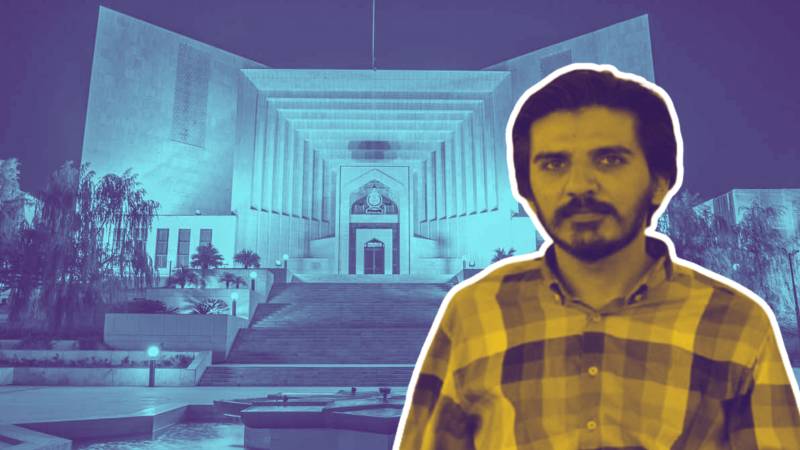
Journalists covering the Supreme Court on Wednesday challenged the constitution of a Joint Investigation Team (JIT) to probe alleged campaigns against judges of the superior courts.
"Lack of appropriate self-regulation by media in some cases should not be compensated by sweeping use of criminal proceedings against journalists to intimidate or blackmail the media," states the petition filed by the Press Association of the Supreme Court (PAS). The petition came after the Federal Investigation Agency (FIA) arrested and obtained a five-day physical remand of journalist Asad Ali Toor from a district and sessions court in Islamabad.
The petition was moved by PAS President Mian Aqeel Afzal and Islamabad High Court Journalists Association (IHCJA) President Fiaz Mehmood moved a petition under Article 184(3) through Barrister Salahuddin Ahmed with the federal government and the FIA listed as respondents. The JIT probing the alleged campaign had issued notices to 46 individuals, including over a dozen journalists and television anchors.
It added that the lack of implementation and enforcement of tort liabilities under defamation or other media-related laws by the subordinate judiciary or concerned statutory bodies cannot be compensated through criminal prosecution of journalists.
The PSA argued that when FIA takes over the duties of enforcing contempt laws by misusing PECA 2016, journalists are often deprived of fair hearing or bail by trial courts, which may be influenced by the fact that the matter pertains to the apex court.
"It is more appropriate that any matter of contempt of this court should be tackled by this court itself," the petition urged.
The petition contended that the power to punish for scandalisation of a judge or the judiciary, so cautiously and sparingly exercised by the top court, cannot be handed over to the FIA "to be used as and when it deems fit".
"Moreover, it would violate the doctrine of separation of powers," the petitioners argued.
"It should also be noted that, on occasions, defamatory or contemptuous material on social media is not attributable to recognised journalists but even to state-sponsored sources."
"Astonishingly, the notification dated January 16, 2020, appointing a JIT does not task it with investigation of any particular FIR/criminal case," it contended, adding, "Nor does it refer to any section of PECA alleged to have been infringed or to any complaint that may have been made to FIA about any specific social media posts/tweets etc."
Instead, it directs the JIT to "ascertain facts behind malicious social media campaign [against] honourable Judges" and bring culprits to book and suggest preventative measures and present the Ministry of Interior with its preliminary report within 14-days."
The petition further argues that the federal government appears to have confused the role of a JIT under Section 30 of PECA 2016 with a Commission of Enquiry.
"The intent behind setting up a Joint Investigation Team (including representatives of intelligence agencies) with such broad and all-encompassing reach is clearly to send a message to all that any person who criticises the Supreme Court on social media shall be liable to arrest and serious punishment."
"This attempt to chill or curb public criticism is hardly uncommon for the executive. But it has never been the practice or tradition of this court."
Freedom of speech is the cornerstone of any democratic state governed under the rule of law, the journalist association stated.
"It is not merely a liberty inhering in the citizens of a free state. It is both an essential prerequisite to the meaningful exercise of the right to vote and a check against abuse or misuse of power by state institutions."
"Thus, a free, vibrant and independent media is termed the fourth pillar of state," it argued, adding, "Guaranteeing freedom of speech does not mean merely allowing speech that is factually correct, reasonable and inoffensive."
"It involves forbearance and tolerating (subject to certain explicitly defined exceptions) even speech that is misguided, unreasonable or offensive."
"The need to ensure free speech must be balanced against the need to ensure public confidence in the judiciary. This balancing act is performed by our courts through invocation of the powers of contempt. But historically, this court has been very circumspect in exercise of powers of contempt in such matters. It is slow to anger and quick to forgive."
On the other hand, the petition said that apart from the reputation of the judiciary, judges possess an individual right to a reputation similar to any other citizen of Pakistan.
"This right to preservation of reputation can be protected by recourse, inter alia, to section 499 PPC."
"However, this is a non-cognisable offence that requires filing of a criminal complaint before the concerned magistrate, and any subsequent inquiry or investigation (or arrest) are subject to his orders."
The petition argued that Section 499 of the Pakistan Penal Code (PPC) is not a scheduled offence under the FIA Act 1974, so FIA does not, in any case, have any jurisdiction.
The top court was requested to declare that the FIA has no jurisdiction to inquire into or investigate so-called explicit and malicious campaigns against Supreme Court judges. The associations have further requested the top court to declare the same to be in violation of the Constitution and ultra vires of PECA 2016.
The Supreme Court was requested to consequently strike down the notification of the constitution of JIT and any FIA notices under section 160.
The petition also requested the top court to declare that Rule 17 of the PECA Investigation Rules 2018 is, insofar as it allows the inclusion of intelligence and other government or public sector organisations and agencies in a JIT ultra vires of section 30 of PECA 2016.

